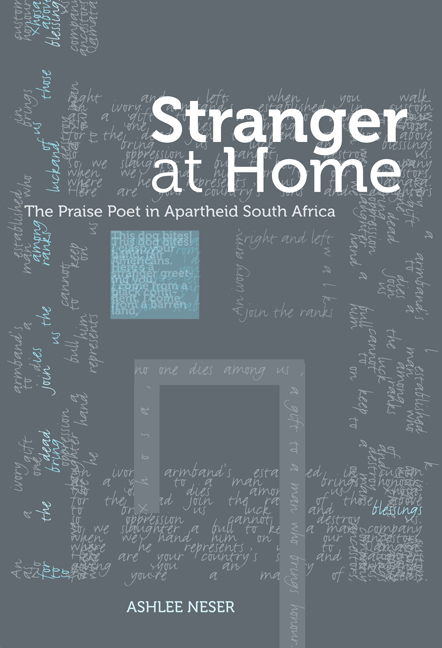six - Telling lies truer than the truth
from part two
Published online by Cambridge University Press: 17 May 2019
Summary
In 1988, Manisi won funding from the Fulbright Foundation to visit American universities in his capacity as an expert exponent of the art of the Xhosa imbongi. Based at Vassar College in Poughkeepsie, Manisi produced poems for several university courses, including Opland's lecture series on oral poetry, Robert De Maria's ‘Transformations of the Word’ classes, and Paul Russell's ‘Politics of the Imagination’ course. As well as performing for student audiences, Manisi gave a public performance at Vassar's Taylor Hall, and produced intimate, spontaneous poems on two occasions at private dinners. In addition to their Vassar engagements, Manisi and Opland toured American campuses, presenting their ‘lecturedemonstrations’ at the universities of Columbia, Harvard, Berkeley (where Manisi also participated in the Old English Colloquium), Pennsylvania, New York and Texas. Although Manisi was to have stayed at Vassar for six months, his wife's sudden death in childbirth abruptly ended his Fulbright term after four months, during which time he had addressed the most foreign audiences and, perhaps, the most complex political contexts of his career.
American universities responded with a mixture of eager anticipation, unease and open hostility to the prospect of hosting a black South African poet whose poetry and public career were associated with a ‘homeland’ chief. Several members of the English Department at Vassar had laboured enthusiastically to promote the poet to the Fulbright Foundation as an expert exponent, rather than a foremost scholar, of Xhosa oral poetry. The Foundation's Scholar-in-Residence award was conventionally designed to bring leading academics to American universities. Although the application on Manisi's behalf succeeded, the refusal of Vassar's Africana Studies Department to support the project perplexed and upset many of those who had been excited about the prospect of Manisi's visit. The political furore that would arise on the Vassar campus while Manisi was there owed much, Opland explains, to the attitude of Moses Nkondo, a black South African in self-imposed exile in America who was employed jointly by Vassar's Africana Studies and English departments. An active ANC member, Nkondo had reprimanded Opland for his public discussion of ethnic cleavages among South Africa's black population, and had decided before meeting Manisi that the poet was a sell-out whose association with the discredited chieftaincy damaged the image of unified black resistance that Nkondo wished to promote abroad (Opland 2005).
- Type
- Chapter
- Information
- Stranger at HomeThe Praise Poet in Apartheid South Africa, pp. 205 - 238Publisher: Wits University PressPrint publication year: 2011



